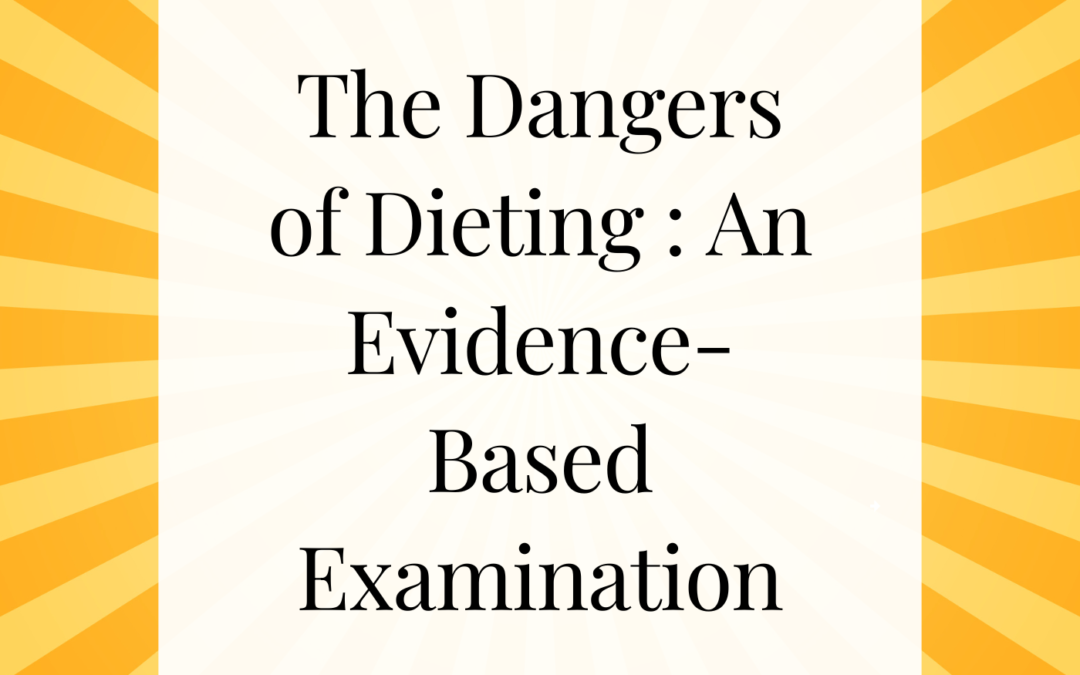In a world obsessed with thinness and how we look, dieting seems to be everywhere we look. From keto to intermittent fasting, diets promise quick results and magical health. But there are actually many dangers to dieting that you probably haven’t even been told about. This blog explores the science-backed side effects of dieting.
Consequences of Dieting
One of the biggest talking points here is the conversation around metabolism. We have studies to show that as you restrict calories, your metablism will go down. This means you need less calorie to keep you alive (the sciencey term is BMR). The studies talk about something known as “metabolic adaptation” or “adaptive thermogenesis”, can make weight loss increasingly difficult and weight regain more likely. This means that it takes less energy to stay alive and to move. This in turn means that it takes less calories to live. This may explain why when you regain weight, you overshoot the weight you used to be. And we have alot of research to show this.
A study examining participants from the reality TV show “The Biggest Loser” found that six years after the competition, participants’ resting metabolic rates were significantly lower than expected for their body size, making it easier for them to regain the lost weight (Fothergill et al., 2016).
How about Food Noise and dieting?
Dieting has such a huge impact on our mental health. We have research to show that dieting takes up so much headspace (more so in women and people in marginalised bodies) and actually shown to increase cortisol through stress and anxiety. Restrictive eating patterns can also cause a preoccupation with food which is what we now call food noise. This psychological burden can result in a harmful cycle of dieting, breaking the diet and then feeling guilty; which can negatively impact mental health and overall well being.
Research highlights the link between dieting and increased stress, showing that individuals who engaged in restrictive dieting experienced higher levels of cortisol which can contribute to weight gain and other health issues (Tomiyama et al, 2010). Dieting can also come with mood swings, irritability and even depression due to thinking about food and body 24/7.
Diets can cause Eating Disorders
Did you know that dieting can actually cause eating disorders or disordered eating? Restrictive diets often promote an all or nothing mentality, where certain foods are labelled as “good” and “bad”. This dichotomy can lead to binge eating, where individuals consume large quantities of the restricted foods once they allow themselves a break from the diet as well as anorexia, bulimia and orthorexia.
A meta-analysis found that dieting was associated with a higher risk of developing eating disorders, such as binge eating disorder and bulimia nervosa. The study concluded that dieting could trigger episodes of binge eating, particularly in those with a predisposition to disordered eating behaviours (Polivy and Herman, 1985). The National Eating Disorders Association found that 35% of dieting becomes obsessive. 20 to 25% of those diets turn into eating disorders. It is important to know that not only large bodies people can have binge eating disorder, smaller bodied people do too. This is the same for restrictive eating disorders, not just smaller bodies people experience restrictive eating disorder, large bodied people can as well.
Nutritional Deficiencies and Dieting
If you think about it, many diets tell you to restrict in one way or another. This restriction can actually lead to nutritional deficiencies. Low carb diets may results in not enough fibre, vitamins and minerals as an example.
A study that shows the potential risks of low carbohydrate diets found that these diets can lead to only short-term weight loss and they may also increase the risk of deficiencies in essential nutrients, adversely affecting overall health (Zinn et al, 2017).
Another study amoung students shows that dieting increased the prevalance of iron deficient anemia.
Yo-yo Dieting actually comes with Health Risks
Yo yo dieting or weight cycling can actually have detrimental effects on long term health. I wonder if any of these health risks remind you of something. Studies suggest that weight cycling is associated with an increased risk of cardiovascular disease, type 2 diabetes and overall mortality. It sounds like what people say being in a large/fat body. I know this is a suprising danger of dieting!
A study examined the long term effects of weight cycling and found that individuals who experienced frequent weight fluctuations had a higher risk of heart disease and mortality compared to those with stable weight, regardless of their overall body weight (Lissner et al., 1991). Additionally, weight cycling can lead to changes in body composition, with an increase in fat mass and a decrease in lean body mass over time (Montani, Schutz and Dulloo, 2015). The reality is that we do not actually have many studies just looking at weight cycling, but alof of studies that come to this conclusion anyway. The reality being that we live in a capitalist society and exploring weight cycling would not make money but lose it!
Financial Consequences of Dieting
Dieting can also be so bloody expensive. Many popular diets require purchasing specific foods, supplements or subscription plans. The cost of diet-related products and services can strain personal finances, particularly if the diet is not sustainable in the long run.
A study by Benenden health revealed that we spend on average £20000 on dieting throughout a life time in the UK . This financial investment often does not translate into long-term weight loss success, leading to repeated spending on new diets and products. This cycle of spending can lead to financial stress, compounding the psychological burden of dieting.
Long term Sustainability of Dieting
One of the most important and significant dangers with dieting is its long term sustainability. Diets are difficult to maintain over extended periods due to their restrictive nature. This leads to people abandoning the diet, regaing the weight they lost, feeling incredible shame about the weight gain and feeling like they failed the diet (when it was the diet failing them).
A review examined the long-term effectiveness of various diets and found that most dieters regain lost weight within five years. The review highlighted the need for sustainable lifestyle changes rather than short-term dieting to achieve which would be a weight inclusive way of living like Health at Every Size (Mann et al., 2007).
Should I Diet? Weighing the Pros and Cons
Are you still considering dieting? Well, that is totally understandable because this world really hates people in large bodies. Society makes sure that we know from an early age that fat bodies are bad bodies and we should diet no matter the cost. When actually, as you can see, dieting comes at a considerable cost.
I want you to have a think about those perceived benefits you think about when losing weight and dieting.
But I feel better when I lose weight!
I hear you, but is that due to the behaviours you have while dieting? Are you eating more fruit and vegetables? Drinking more water? Drinking less alcohol? More fibre? Have you been moving your body more? A combination of these, regardless if you lose weight would make you feel better. If you think though, a diet is usually short term. What if you could have these behaviours as long term behaviours while taking your focus away from weight.
I am healthier when I lose weight
Are you sure? We have a lot of evidence that shows that many changes in markers of health like blood glucose and cholesterol actually only have a short term reduction when dieting for weight loss. We also have plenty of evidence that shows that health is only correlated with weight. It could be experience of weight stigma that impacts health, we just do not know. But we do know we can have healthy behaviours without focusing on weight.
But I want to feel better about my body and improve my body image
The harsh reality is that body size is not related to body image. Body image is so complicated.
Let me give you this explanation. You go along your day feeling ok about your body or not either thinking about it. You go to bed and then you wake up with your body on your mind, really disliking what you see in the mirror. What has changed body wise? Probably nothing at all.
A great place to start exploring this is with Molly Forbes over at Body Happy Org.
The alternative to Dieting is Intuitive Eating
If you have read this and are thinking about not dieting because of the dangers of dieting your have read, then intuitive eating may be for you. It takes the focus away weight and helps you heal your relationship with food. If you would like to find out more about Intuitive eating, here is something you can read to work out if it is for you.


